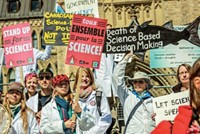Advertisement
Grab your lab coat. Let's get started
Welcome!
Welcome!
Create an account below to get 6 C&EN articles per month, receive newsletters and more - all free.
It seems this is your first time logging in online. Please enter the following information to continue.
As an ACS member you automatically get access to this site. All we need is few more details to create your reading experience.
Not you? Sign in with a different account.
Not you? Sign in with a different account.
ERROR 1
ERROR 1
ERROR 2
ERROR 2
ERROR 2
ERROR 2
ERROR 2
Password and Confirm password must match.
If you have an ACS member number, please enter it here so we can link this account to your membership. (optional)
ERROR 2
ACS values your privacy. By submitting your information, you are gaining access to C&EN and subscribing to our weekly newsletter. We use the information you provide to make your reading experience better, and we will never sell your data to third party members.
Policy
Travel Limits Hinder Scientists
White House directive may curtail government scientists’ attendance at scientific meetings
by William G. Schulz
August 13, 2012
| A version of this story appeared in
Volume 90, Issue 33

Significant travel spending cuts and other travel restrictions ordered by the White House for all executive branch departments and agencies could undermine government scientists’ participation in scientific meetings, say a number of observers inside and outside government. Further, these observers add, the cuts and restrictions could stifle innovation that could stimulate the economy and could discourage young people from choosing science careers that are devoted to public service.
The cuts and restrictions are part of a May 11 memo from Office of Management & Budget Acting Director Jeffrey D. Zients. The OMB memo calls on agencies to cut 30% of their travel spending from 2010 budget numbers. The directive also says agency travel spending on any one scientific meeting that exceeds $100,000 must be approved at the deputy secretary level, and for those exceeding $500,000 in costs, agency directors must weigh in to deny or provide waivers for these expenses.
“The intent of the guidance is to drive efficiencies in federal travel practices while protecting travel activities that are critical to agency missions,” says a spokesperson for OMB. “We understand the importance of travel to the science and innovation community in the federal government, and this Administration intends to continue its excellent record of support for innovation and research and development in a fiscally constrained environment.”
Nonetheless, American Chemical Society Director of Public Affairs Glenn S. Ruskin points out, sending 250 scientists from the Department of Energy national labs to just one ACS national meeting would easily exceed the $500,000 figure. What’s more, OMB is now asking for “transparency” measures that would mean additional reporting requirements and expense tracking for scientists who attend meetings, Ruskin notes.
There is also concern being voiced from within the agencies by managers, who call the cuts “overwhelming.” ACS Immediate Past-President Nancy B. Jackson, a manager at Sandia National Laboratories, for example, notes that attendance at scientific meetings is “how scientists get ideas and learn what’s up—there is no substitute for being there.” In bowing to congressional pressure to cut spending, she says, the White House orders carry huge unintended consequences for the science community and are exacting a heavy toll on the morale of government scientists.
“It’s just one more blow, one more swipe,” Jackson says. She says the directive will potentially drive away young scientists from government service because of the extra burdens and limits.
And for all of that, Jackson says, the added reporting requirements will simply add to agency administrative expenses and likely wipe out any savings from the travel cuts themselves.
Representatives of other scientific societies point out that the cuts and transparency requests are not happening in a vacuum. Government spending cuts are a reality that Democrats and Republicans in all branches of government have embraced.
It is unclear why Zients’ memo is coming to light just now and receiving broader attention, but it is likely because the policies are set to take effect 90 days after the memo was issued. If agencies and agency scientists do not comply with the new reporting requirements for travel that OMB has mandated, they risk not being reimbursed for their expenses.
At the same time, a bill winding its way through Congress, H.R. 4631, the Government Spending Accountability Act of 2012, is similar to the new OMB requirements, Ruskin says, and raises similar concerns. The legislation goes further, however, by forbidding agencies from spending in excess of $500,000 for a single conference and stipulates many other public reporting requirements.
Ruskin and others say that reports earlier this year about lavish spending on a Las Vegas meeting of General Services Administration employees are likely the impetus for the new restrictions. Although many GSA employees were fired over that scandal, it was politically damaging to the White House.
Ruskin says he and his counterparts at other scientific societies have requested a meeting with OMB to discuss the “unintended consequences” of the new travel requirements but have not received a reply. Meanwhile, he says, officials at the White House Office of Science & Technology Policy (OSTP) have told him that they advised OMB on the new policy, but that advice “doesn’t appear to have been heeded.”
Jackson says she is surprised by the lack of an aggressive response to the memo from OSTP or DOE. “I have heard nothing from OSTP. I have no idea where they stand,” she says. She says the lack of response from DOE Secretary Steven Chu is particularly surprising given his credentials as a Nobel Laureate.




Join the conversation
Contact the reporter
Submit a Letter to the Editor for publication
Engage with us on Twitter